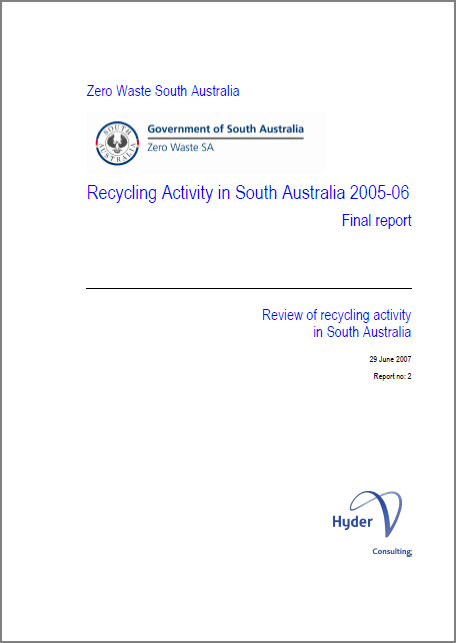
- Waste and recycling
Recycling activity in South Australia 2005-06
In 2005–06 2.40 million tonnes of materials, ranging from asphalt to textiles, was diverted from landfill to recycling, in South Australia. This was down from the 2.62 million tonnes recycled in 2004-05, but still significantly above the 2003–04 result of 2.04 million tonnes. A unknown proportion of the apparent decrease in recycling from 2004–05 to 2005–06 is due to the modification of the reprocesses survey to specifically identify and exclude any recyclate material generated interstate or overseas which is then imported for reprocessing in South Australia. In 2005–06 there was 81 152 tonnes of these recyclate materials imported into South Australia for reprocessing, or 3.3% of total local reprocessing. These materials were mostly fly ash, steel and glass. Reprocessing quantities of concrete, steel, timber, flyash and garden organics were the highest, by weight. A survey of total recycling activity was coordinated in late 2006 and into January of 2007 by Hyder Consulting. The survey covered all materials recovered for reprocessing in South Australia, as well as exported materials. Any materials imported into the state for reprocessing were excluded. Eighty local (South Australian based) and interstate reprocessing destinations were identified, as well as exports overseas.v Recycling data was obtained from the following sources: 1 Reprocessors - site visits of the key reprocessing sites in the Adelaide metropolitan area - telephone/e-mail surveys of recycling companies 2 Data collated from pre-existing annual surveys, undertaken by the following national organisations: - Ash Development Association of Australia (ADAA) - Compost Australia - Plastics and Chemicals Industries Association (PACIA) - Publishers National Environment Bureau (PNEB) South Australia has been compiled into this report (excluding one interstate destination of scrap metal), and as such the reported recovery data is believed to be highly comprehensive. However, some smaller South Australian based material reprocessors or interstate destinations may have been overlooked, in which case the reported recovery quantities would be slightly conservative.
Download




